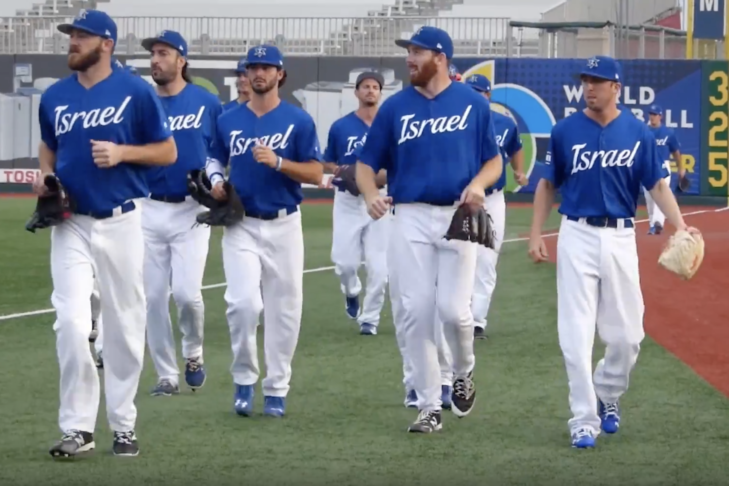I’m honestly not sure where and when my love affair with Team Israel began, but it became very intense very quickly.
I put the July 14 Hartford, Connecticut, exhibition baseball game on my calendar as soon as I heard about it, but unfortunately was not able to attend. However, I managed to live-stream that game, which they lost big-time. But, oh well, it was still a thrill. I asked friends who did attend to send me photos and a video clip of the playing of “Hatikvah,” as well as the throwing of the first pitch by Ambassador Meron Reuben, consul general of Israel to New England. The following day, the second exhibition game in Hartford could not be live-streamed and it took me ages to ascertain the final score in a game they won! I was already becoming very invested in the team’s success.
Allow me to backtrack a bit. In summer 2007, I visited Israel and watched the Israel Baseball League play in Tel Aviv. My teenage nephew had landed an internship with the team. I still have my ILB baseball hat. I remember hearing “Hatikvah” played, as well as other Israeli music, and meeting Dr. Ruth Westheimer, an unlikely fan who was also on the sidelines. She, too, was an enthusiast, and, yes, I did get her autograph. I attended a second game in Beit Shemesh with my late father and his best friend, who had made aliyah years earlier. We cheered in the stands with mostly American olim. It was clear that baseball—an American import—was struggling for acceptance in the Holy Land. The players were, for the most part, American imports, both Jewish and non-Jewish, who had signed up for a short-lived adventure. Despite a noble effort by an American Jewish entrepreneur from Brookline who established the ILB, It didn’t go particularly well in the end and the league disbanded.
So, I was as amazed as everyone else when I heard the news that Team Israel had qualified for the Olympics. Apparently I completely missed the rebirth of Israeli baseball that resulted in the team’s efforts at the World Baseball Classic of 2012 and the relative success of Team Israel in the international competition in 2016 in which they defeated Korea, the Netherlands, Great Britain and even powerhouse Cuba. Nor had I heard about the Africa/Europe 2020 Olympic Qualification Tournament in Italy in 2019. As they say in Hebrew, “Ma pitom?” Or, how in the world did that happen?
I now know a lot more about the backstory. Following the debacle of 2007, baseball continued to be played in Israel by a small but steady group and some really amazing individuals—in particular American oleh Peter Kurtz, who’s now Team Israel’s general manager—who had the dedication and perseverance to build both youth and adult leagues that miraculously led to successes in the World Baseball Classic followed by qualifying for the Olympics. (See the moving documentary “Heading Home” for the inspirational backstory, as well as the recent “New England meets Team Israel on their way to the Olympics” co-sponsored by the Israeli Consulate and JNF on YouTube.)
Team Israel’s players in Tokyo were, for the most part, not indigenous Israelis. They are primarily composed of Jewish Americans who technically made aliyah in order to qualify to play for Israel in accordance with the Israeli law of return. Their backgrounds vary greatly in terms of their Jewish identity. I quickly became familiar with most of the 24 members of the team’s roster who actually went with the team to Tokyo. Only four were native Israelis.
So, let’s return to July 29, Team Israel’s first game against the USA in the opening match. I had heard that the game would begin at 6 a.m. ET, but had no idea how to find it. And no one I asked seemed to know or care, for that matter. This was the beginning of my realization that I was going to be one lonely fan. No watch parties for me! The night before the first round, my husband patiently helped me figure out how to access the live-stream on NBC. I still lacked confidence I could succeed due to my technology challenges. I set my alarm and arose to watch, exhausted before I even began. The first game did not go well. No matter. There would be another one at 6 a.m. the following day. By then, I was an expert in live-streaming.
The second game against South Korea was a total nail-biter, went into an extra inning, and resulted in a heartbreaking defeat caused by a crazy walk with bases loaded. So close—but that’s baseball! The next games were scheduled for 11 p.m. The win over Mexico was absolutely thrilling and given the lopsided score, Team Israel was able to include two native Israelis toward the end of the game (at roughly 3 a.m.). I’m sure it was a thrill of a lifetime for them.
Game 4 against South Korea was the only game I essentially skipped, both because by then my body was completely spent from the late nights and early mornings, and because I sensed after one inning that it was going to be a disaster, which it was.
So, that brought me to Game 5, the early morning elimination game on Aug. 3. Of all the crazy things, I had to be at a work event that morning and had to leave my house by 8:30 a.m. At precisely that point in time, Israel and the Dominican Republic were tied 6 to 6 at the top of the ninth inning! It just couldn’t get more high-stakes than that. But duty called, so this very loyal fan had to abandon the screen and head out into the real world. About 20 minutes into the car ride, I asked my driving companion to check on the score. And that’s when my heart sank: a 7 to 6 final score in favor of the DR. I was devastated. I wanted one last glimpse of the young and not-so-young men I had become so attached to over an intensive five-day period. I wanted to commiserate with them over how near they came to victory in two very close games. I was praying for a bronze medal. Although I was a lonely fan without a watch party of my own, I knew there had to be other fanatics out there who were equally exhausted and disappointed. (And a special thanks to a dear friend who put up with my annoying early morning frequent texting updates. It helped ease my loneliness a bit.)
But before I conclude, I want to reflect on why I became so personally invested in this particular Olympics competition.
I guess it has to do with the depth of both my American Jewish identity and my strong connection to Israel. Ironically it has almost nothing to do with a passion for baseball itself.
It was just so incredibly interesting to think about the reality of who these so-called “Israeli” players were: They were talented American Jewish athletes who had played in both the major and minor leagues, who clearly love Israel but who, for the most part, have only a superficial connection to the country. Most had never been before becoming Israeli citizens. Regarding their Jewish identities, they were all proud Jews. Some were the product of two Jewish parents and some came from interfaith families. In several interviews, they talked about the special, almost immediate, bond they felt toward one another on this team, a place where being a Jewish baseball player was finally the rule and not the exception to the rule. In his running commentary during the games, the Olympics sports announcer was constantly referencing aspects of each player’s connection to his Jewish heritage.
Mitch Glasser was raised with a strong Jewish background and attended a Jewish day school in Chicago for 11 years; third-baseman Danny Valencia has two Jewish parents since his father, a Cuban immigrant, converted to Judaism. He grew up with people being surprised that he was Jewish on account of his name; pitcher Jeremy Bleich’s grandparents were Holocaust survivors, which left an indelible impression on him; Ty Kelly’s Jewish grandmother in Boca Raton was so excited and proud to hear that he had become an Israeli citizen; pitcher Josh Zeid had “Take Me Out to the Ballgame” written in Hebrew on his glove. And on it went.
When would this sort of background information ever be shared in a Major League Baseball game? The answer is simple: never! In the major leagues, Jewish fans kvell when they manage to identify a single Jewish player. After all, Jews are not generally known for their athletic prowess, especially as baseball players. And when we’re not sure whether or not a player is Jewish, endless speculation ensues. Yet here, on Team Israel, American Jews were presented with endless opportunities for feeling proud.
Most native Israelis cannot really understand the American Jewish perspective on Team Israel for this reason. As a Jewish majority in Israel, they cannot relate to feelings of marginalization and being regarded as “the other.”
If they were the least bit interested in Team Israel—which I’m convinced most were not because baseball is still not valued—they might cynically dismiss the team as not being authentically Israeli. I don’t say this to be critical; it’s just a reality. But for an American Jewish Zionist like me, nothing could have been sweeter than this team. In fact, what could have been sweeter would have been a team that was closer to 50/50 native Israeli and American, with the Israelis representing the diversity of its multi-ethnic society. But one step at a time.
The Summer Olympics have now concluded and there will be no baseball played in the Paris Games of 2024. And who knows if Team Israel will qualify in 2028? This could have been a one-time thing like “Brigadoon.” If that’s the case, I say, “Dayenu.” You played your hearts out and gave us such a thrill, Team Israel. And I do hope baseball grows in Israel for no other reason than it provides a wonderful bridge between diaspora Jews and Israelis. Moreover, baseball is a popular sport globally, which affords Israel additional opportunities to connect with other nations and establish legitimacy in a frequently hostile world.
Hopefully Team Israel’s unlikely Olympics experience will inspire greater investment in the sport, and I must say I’m thrilled to know there will be a state-of-the-art field built in Ra’anana, with the support of JNF-USA, dedicated to the memory of Ezra Schwartz, z”l, the Sharon teen who loved baseball and lost his life in a terrorist attack almost six years ago. JNF’s Project Baseball is generally a critical source of support for the sport in Israel.
So, surprisingly to me, for an intense five days this mid-summer, I bonded deeply with Team Israel’s quixotic quest for the impossible dream to medal in the crazy COVID-driven Tokyo 2020 Olympics. It made my world bigger and grander even without a watch party. And I just know there are other fans out there as well who I’d love to shed a tear with, but also share the heartfelt pride I experienced in rooting for Team Israel early in the morning and late at night—an exhausting but inspiring and unforgettable journey.
This post has been contributed by a third party. The opinions, facts and any media content are presented solely by the author, and JewishBoston assumes no responsibility for them. Want to add your voice to the conversation? Publish your own post here. MORE



